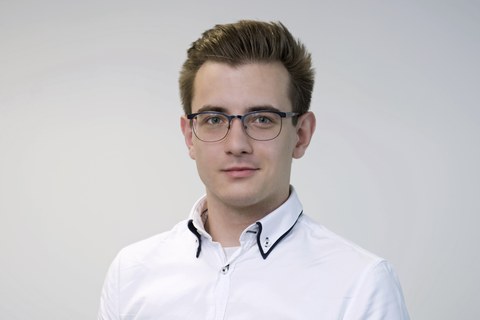Daniel Vrankar
Inhaltsverzeichnis
- 1. Was ist der Titel Ihrer Dissertation? Wie ist die Idee entstanden, sich in der Promotion gerade mit diesem Thema zu beschäftigen?
- 2. Was sind die zentralen Forschungsfragen, die Sie sich in der Dissertation stellen und mit welchen Methoden versuchen Sie, diese Fragen zu beantworten?
- 3. Was sind die Ihrer Meinung nach bisher die spannendsten Ergebnisse Ihrer Forschung?
- 4. Sie sind seit dem 01.07.2023 an der Fakultät als wissenschaftlicher Mitarbeiter tätig und für die Fortsetzung Ihres Promotionsprojekts mit Prof. Hornhuf von der Uni Bremen an die TU Dresden gewechselt. Worauf freuen Sie sich hier in Dresden besonders und was wird Ihnen von Ihrer Zeit in Bremen besonders positiv in Erinnerung bleiben?
1. Was ist der Titel Ihrer Dissertation? Wie ist die Idee entstanden, sich in der Promotion gerade mit diesem Thema zu beschäftigen?
Der Titel meines eingereichten Exposés lautet „Satellitendaten in den Wirtschaftswissenschaften“, mittlerweile lässt sich das Thema meines kumulativen Promotionsvorhabens jedoch besser mit „The Economics of Space“ zusammenfassen. Die Analyse der Satellitendaten stellt dabei mittlerweile nur einen Teil der Promotion dar.
Raumfahrt hat mich schon immer fasziniert und so habe ich mich auch in meinem Studium als Wirtschaftsingenieur im Bereich der Luft- und Raumfahrttechnik vertieft. Ab 2020 arbeitete ich zudem als studentische Hilfskraft am Lehrstuhl von Prof. Hornuf und merkte immer mehr, dass mich auch betriebswirtschaftliche Fragestellungen reizten. Als es dann um ein Promotionsthema ging, hat mich besonders das Papier „An empirical investigation of forward-looking retailer performance using parking lot traffic data derived from satellite imagery“ von Cong Feng und Scott Fay im Journal of Retailing (98(4):633-646) inspiriert, meine Begeisterung für Raumfahrt und Wirtschaft in meiner Dissertation zu verbinden. Dazu kommt der Aufstieg von sogenannten New Space Unternehmen wie SpaceX in den letzten 10-15 Jahren. Diese Unternehmen haben mit Innovationen wie wiederverwendbaren Raketen viel Bewegung in die Branche gebracht. Die wirtschaftlichen Auswirkungen, aber auch die öffentliche Unterstützung für diesen neuen Zweig der Raumfahrtindustrie sind trotzdem bisher wenig erforscht und bieten mir damit ein interessantes Feld für meine Promotion.
2. Was sind die zentralen Forschungsfragen, die Sie sich in der Dissertation stellen und mit welchen Methoden versuchen Sie, diese Fragen zu beantworten?
Die drei zentralen Fragen meiner Dissertation lauten:
- Wie innovativ ist die Raumfahrtbranche, besonders die New Space Branche?
- Welche Faktoren bestimmen die öffentliche Meinung über staatliche Zuschüsse zur Raumfahrt?
- Wie lassen sich Satellitendaten am Kapitalmarkt nutzen?
Für die erste Forschungsfrage untersuchen wir über 35.000 Patentanmeldung aus der Raumfahrt. Mit Hilfe einer Netzwerkanalyse analysieren wir dabei zunächst, welche Branchen von Innovationen in der Raumfahrt profitieren. Im Anschluss benutzen wir statistische Hypothesentests, um zu überprüfen, ob New Space Unternehmen (wie z.B. Blue Origin) innovativer sind als etablierte Luft- und Raumfahrtkonzerne (wie z.B. Airbus oder Boeing).
Vor zwei Monaten haben wir zur Beantwortung unserer zweiten Forschungsfrage ein weltweites Umfrageexperiment in den neun größten Raumfahrtnationen durchgeführt. Die Bürger der verschiedenen Nationen wurden dabei mit unterschiedlichen Szenarien konfrontiert und im Anschluss nach ihrer Meinung zur staatlichen Raumfahrtförderung befragt. Zurzeit befinden wir uns hier in der Auswertung mithilfe von Regressionen und statistischen Hypothesentests.
Zu guter Letzt haben wir bereits einige Satellitendaten der Satelliten Sentinel-2A und 2B extrahiert. Diese wollen wir nutzen, um zu untersuchen, ob uns die Daten auf Rohstoffmärkten einen Informationsvorteil verschaffen können. Hier suchen wir derzeit in der Literatur nach dem besten Modell, auf dem unsere Schätzung für die Angebotsmenge bestimmter Rohstoffe aufbauen kann.
3. Was sind die Ihrer Meinung nach bisher die spannendsten Ergebnisse Ihrer Forschung?
Durch die Analyse der Patentdaten haben wir herausgefunden, dass Innovationen aus der Raumfahrt auch Fortschritte im Bereich des 3D-Drucks, sowie Solarzellen und Batterien befördern (Spillover-Effekte). Dazu scheinen oftmals stärker privatwirtschaftlich organisierte New Space Unternehmen im Vergleich zu traditionellen Luft- und Raumfahrtkonzernen Innovationen zu entwickeln, die einen höheren Nutzen für andere Industrien haben.
Die ersten Analysen unseres Umfrageexperiments haben gezeigt, dass Bürger a) die Höhe der staatlichen Raumfahrtförderung massiv überschätzen und b) sich mindestens in den USA und Deutschland wieder in aus dem kalten Krieg bekannte Denkmuster verfangen. Die befragten Bürger lassen sich in ihrer Zustimmung zur staatlichen Raumfahrtförderung besonders davon beeinflussen, wie hoch das Budget von den Nationen ist, die sie zuvor als Gegenspieler klassifiziert haben.
4. Sie sind seit dem 01.07.2023 an der Fakultät als wissenschaftlicher Mitarbeiter tätig und für die Fortsetzung Ihres Promotionsprojekts mit Prof. Hornhuf von der Uni Bremen an die TU Dresden gewechselt. Worauf freuen Sie sich hier in Dresden besonders und was wird Ihnen von Ihrer Zeit in Bremen besonders positiv in Erinnerung bleiben?
Aus Bremen bleibt mir besonders die enge Verbindung zur Raumfahrt im Kopf. So waren es zum Beispiel von unserem Büro an der Universität nur wenige hundert Meter bis zu den Produktionshallen eines der größten Raumfahrtunternehmen Europas (OHB). Das hat sich natürlich auch auf die Forschung ausgewirkt. So waren viele Forscher aus nicht-naturwissenschaftlichen Fachbereichen trotzdem über Forschungsnetzwerke in Projekte mit Bezug zur Raumfahrt involviert. Dieser fachübergreifenden Forschungsansatz hat Bremen in vielen Projekten ausgezeichnet.
In Dresden freue ich mich besonders auf den neuen Input durch Forschungsprojekte meiner Kolleg:innen, aber auch Doktorand:innen anderer Professuren der Fakultät. Mir wurden schon mehrere Vortragsreihen gezeigt, bei denen Doktorand:innen ihre aktuelle Forschung vorstellen, die ich in jedem Fall besuchen möchte. Nicht zuletzt freue ich mich auch wieder auf die Lehre. In Bremen war ich für die Übungen in den Modulen „Spieltheorie“ sowie „Finanzderivate und Optionen“ zuständig, was mir viel Freude bereitet hat.

